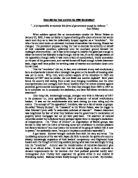Just because there was no coherence between the opposing political parties it is not to say that there was no attempt to reform. A general strike did take place in St. Petersburg and Moscow simultaneously, co-ordinated largely by Trotsky’s St. Petersburg Soviet. However it was quickly bought off by promises of civil rights and the legislation of trade unions due to its lack of political motivation (many of these demonstrations were economically inspired).
Even though there was major discontent among the peasant communities after the indescribably dismal loss of the Russo-Japanese war and the tragedy of Bloody Sunday, the revolutionaries and activists were not, it seemed, ready for revolution. Instead they were happy to buy into the falsifications that the regime laid on a plate for them. There was far too little solidarity for any one opposition party to be formed, some wanted economic reforms, others political, some wanted to execute their plans by force, others by peaceful means. All of this made it far too easy for the tsar to limit opposition.
The second most significant point in question is that of the military loyalty to Nicholas. This was the most important asset that Russia held during this period, and even though the tsar made some important concessions (which arguably secured his position and I will comment on these later) he made sure that he retained control of the naval and military forces. It is not true that every soldier and naval recruit stayed devoted to their god chosen tsar; in June of 1905 the crew of the Battle Ship Prince Potemkin mutinied and slit the throats of all the officers on board, and as a further sign of protest sailed the ship out of Russian waters.
This was one of the only recorded cases of mutiny in the ranks, but as Witte said while commenting on the troops return from the Far East, ‘if they join the revolution, then everything will collapse’. It would have been understandable if the army had decided to turn on its commander in chief, as the failure of the upper ranks to devise suitable tactics was pitiful. The decision to travel into Asian waters with the entire Baltic fleet cost 12,600 Russian lives alone, with a further 85,000 perishing in the Battle Of Mukden when Commander Stoessel sacrificed impregnable defensive ground.
It was not only the support of the armed forces that the last tsar relied upon; it was also the patronage of the police forces and his secret political police, the Okhranka. Luckily for him the chief of police did not leave his side, and ensured that his force didn’t either. This was vital for the tsar if we wanted to avoid advocating, as it was the power and influence that these two groups brutally upheld that kept the opposition in check.
One could say that it was the lack of restraint from the armed forces during the events of Bloody Sunday that finally pushed the revolutionaries over the edge and forced the tsar to make vital concessions. The fact of the matter is that the military had the final word on whether the tsar lived or died, and as revolution was at this point was almost to be expected they can be attributed to his continued reign.
In 1906 Nicholas re-introduced the secret police force to maintain law and order after promising reforms only a few years earlier. Their continued support helped him and his regime regain important political authority.
As I have already mentioned Nicholas made some important concessions that successfully split the opposition and bought him some valuable time.
After he had witnessed the determination of his long running opposition at the gates of his own palace, and during the strikes that almost crippled the economy permanently, he decided that action had to be taken. The first move was to fill the position of the minister of the interior with the leftist liberal Svyatopolk, after Plehve was assassinated in 1904. This gave renewed hope to many liberal groups, who now believed that there was a visible path forwards for the country. A significant number of liberals now felt that evolution, not revolution, was the key to success, as a revolt could undo the growth they campaigned so hard to achieve.
His next political move was the October Manifesto. Although it was the tsar who eventually published it on the 17th October 1905, it was the influence of Sergei Witte that secured it. The Manifesto itself included concessions on; Freedom of speech, freedom of assembly (the volatility of the situation meant anti-liberal views were already relaxed within government), freedom of the press and a promise to incorporate a bicameral legislative parliament in 1906.
Struve and Miliukov (the respective heads of the liberal parties) accepted this constitution of behalf of the workers, deciding to with hold any criticism for the time it was released in case it did not live up to the standards promised. For the liberals this was a huge step towards a more democratic nation, and in theory it held all the answers to their many problems, but in reality it was an intelligent ploy on Witte’s behalf to split the opposition, rendering it useless. The more militant wings were now isolated leaving a substantial number of opponents in want of peace. It is something I have already mentioned, but there is always strength in numbers, and separating the antagonists was vital for autocratic survival.
A third Duma was also established, incorporating the classes that previously were exempt from voting. They also had supposed power over law passing; just as our house of lords did at this time, the Duma had the power to veto laws that would otherwise be passed. Every law had to be run through them before they were approved.







